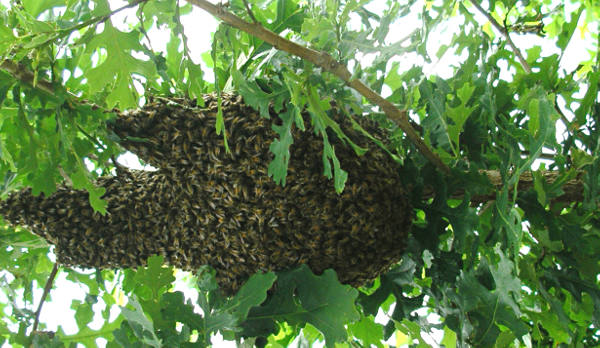May 7, 2013

Drought and up-and-down temperatures are affecting insect behavior – everything from honeybee behavior to delayed emergence of pests, according to a Texas A&M AgriLife Extension Service entomologist.
“Prolonged drought and these cold snaps we’re seeing do have impacts on the food web, and that impacts bees swarming and delayed emergence of some pests such as pecan nut casebearer,” said Dr. Charles Allen, AgriLife Extension entomologist and integrated pest management coordinator, San Angelo.
Honeybee swarming is not uncommon, Allen said. Bees swarm — migrate en masse — when there’s not enough plant growth and nectar supply in an area to support a colony. Part of the hive and new queen leave to start a new colony elsewhere, where there is hopefully a larger food supply.
However, Allen has received reports from other AgriLife Extension entomologists around the state that indicate swarming is more prevalent this spring. The exact cause is unknown, but it’s more likely drought-related than due to the up-and-down swings in temperature.
“This week especially, calls have been coming in to AgriLife Extension offices in the Dallas area for help coping with the sudden bee invasion,” wrote Dr. Mike Merchant, AgriLife Extension urban entomologist, Dallas, on his blog, “Insects in the City.”
“According to Shelly Spearman of the AgriLife Extension office in Rockwall County, her office is getting one to two calls a day about bees,” he said.
Merchant said spring is prime time for bee swarming, so the increase could be one of perception.
He also noted that mosquitoes are already active in many areas. In Richardson and Dallas, city and county spray trucks are already spraying due to extremely early detections of West Nile virus in the local mosquito population.
“This is very early for this disease to show up and is not a good sign,” Merchant said. “It’s possible that we’re just looking harder for the disease after last year’s epidemic year.”
Molly Keck, AgriLife Extension integrated pest management specialist for Bexar County, said managed honeybee hives in the San Antonio area are “not producing as well as they did last year.
“They really haven’t gotten into honey flow yet,” Keck said. “We’ll see what happens after these periods of rain; things may change, and swarms may start up.”
Other insect populations that may be affected by the drought or cold snaps are greenbugs, a pest that spreads disease in wheat, and pecan nut casebearers, Allen said.
With greenbugs, it’s hard to separate the direct effects of the weather from the indirect effects, he said. Greenbugs do thrive in cooler weather, while the insects that prey on them may be set back by low temperatures.
“With cooler weather, greenbugs are in the ‘winner’s seat,’” Allen said. “When temperatures get above 65 degrees or so, then the natural insect enemies of greenbugs get the upper hand. But with the up-and-down temperatures, it hasn’t been cold enough, long enough, to really set back the natural enemies.”
Allen said pecan nut casebearer emergence has been slow this year, and also may be due to an indirect effect of the weather. Moths typically deposit eggs on pecan nutlets soon after pollination.
“In some regions, the frost has killed the buds on trees, and the insects — at least in that case — are responding to up-and-down weather by delaying their emergence.”
More information on the current Texas drought and wildfire alerts can be found on the AgriLife Extension Agricultural Drought Task Force website at http://agrilife.tamu.edu/drought/.
You may also like:
Drought still affecting this year’s grasshopper and honeybee populat…
Like honey bees to the slaughter as hornets swarm hive
Escalating risks of West Nile Virus in rural Texas
You May Also Like




